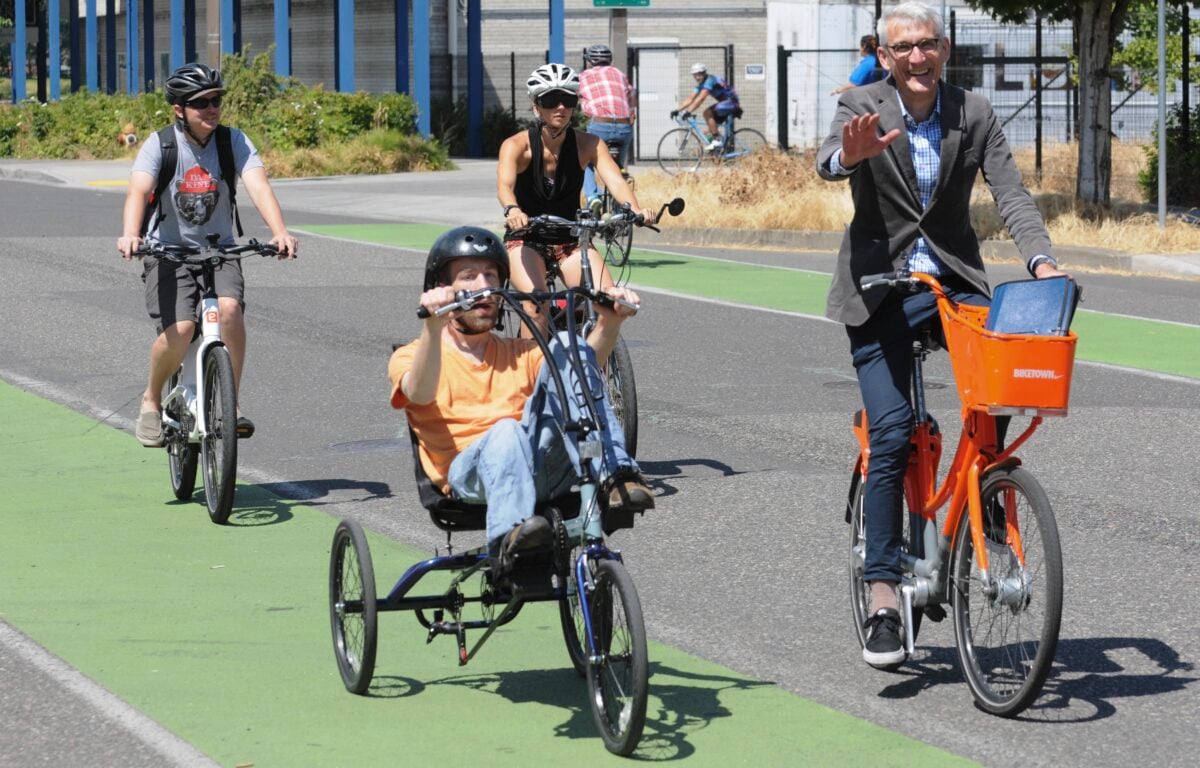
(Photos: Jonathan Maus/BikePortland)
“I’m just speaking from a parent’s perspective and how hard it is to to get certain things done for schools; and to see more cuts even proposed… it’s frustrating.”
— Meesa Long, PBOT budget committee member
Something’s got to go in Portland’s transportation budget next year and the decision about what gets cut is right around the corner.
There are many challenging structural issues with how transportation is funded in the City of Portland and impacts from the Covid-19 pandemic have brought them into even sharper contrast.
One of the troubling quirks in PBOT’s budget is how a sizable portion of their discretionary revenue comes from people driving and parking in the central city — a behavior in direct opposition to many citywide goals. In a typical year parking-related fees from meters, permits, and citations make up about $50 million or one-third of the bureau’s total discretionary revenue. While traffic has inched back up to pre-Covid levels, parking still lags way behind and the hit to PBOT’s budget has been severe.
Advertisement
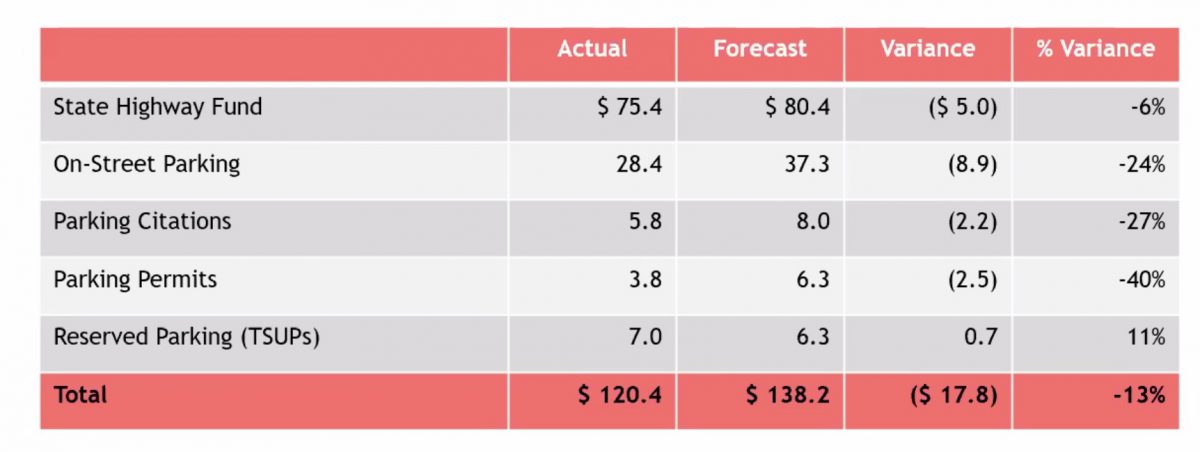
(Source: PBOT)
PBOT says parking revenue was down 90% in April and remains about 55% below forecasted levels. And the outlook isn’t great either. PBOT staff say it could take years to return to baseline revenue levels — and the baseline itself might have shifted for good.
Combined with declines in revenue expected from state and local gas taxes (the other source of funding not dedicated to specific uses), PBOT faces the daunting task of shaving 10% from its “general transportation revenue” (GTR) for the 2021-2022 fiscal year (July 1 to June 30). With help unlikely to come from the city’s general fund (which only accounts for a paltry 0.22% of PBOT’s budget), this means PBOT will have to trim from popular programs and services that are already pretty lean.
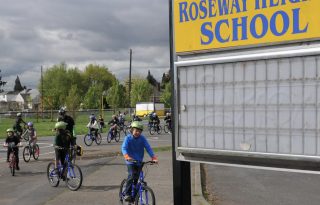
Last night the PBOT Bureau Budget Advisory Committee (BBAC) began the hard work of prioritizing where the cuts will come from. Everything is on the table, including cherished projects in the Active Transportation & Safety program. At the meeting, members were given a presentation from PBOT staff that included a slide proposing potential cuts to: the Biketown bike share system ($35,000); Biketown for All ($50,000); Safe Routes to School ($65,000); Sunday Parkways ($40,000); and the Transportation Wallet, a service that offers discounted bus, bike, scooter and streetcar fares ($20,000).
Other possible cuts could include: a $900,000 cut to the sidewalk budget, a $400,000 cut to maintenance of street lights and signals, and a $400,000 cut to street cleaning just to name a few.
Committee member Meesa Long was surprised to see Safe Routes to School on the list. “I’m a teacher and I work and live in a neighborhood that has no sidewalks and Safe Routes to School is a really big deal for me and my neighbors and my colleagues… I’m not really sure what they would cut,” she said. In a typical budget cycle, making it safer to get to and from school would be an untouchable priority — but with no return to schools in sight, some people think it’s less important.
When a PBOT staffer clarified that the Safe Routes to School cut wouldn’t impact street projects but would come out of an in-school safety education program, the Long was still concerned. “I’m just speaking from a parent’s perspective and how hard it is to to get certain things done for schools; and to see more cuts even proposed… it’s frustrating.”
Advertisement
When it comes to Sunday Parkways, a different committee member had a similar point of confusion. “Are those [events] even happening in 2021?” he asked.
Committee member Sarah Iannarone, who received 41% of the citywide vote in the recent Portland mayoral election and represents the Bicycle Advisory Committee, made a strong plea to avoid cuts to bike share and transit discounts. “I’m having a hard time looking at a $20,000 cut to the Transportation Wallet, which we fought so hard to get in place, with $300,000 in take-out [food] for police at protests this summer alone — that’s more than all the cuts proposed to Active Transportation combined [$210,000].”
“We should be fighting against cuts like this because we want to be growing these programs. We want to be growing access for people with disabilities into cycling, not cutting into them.””
— Sarah Iannarone, committee member
“I feel like $20,000 from the Transportation Wallet is robbing us of something that is a rounding error in the whole city budget,” Iannarone continued. “and we should be fighting against cuts like this because we want to be growing these programs. We want to be growing access for people with disabilities into cycling, not cutting into them.”

The BBAC’s task over the next few weeks will be draft a letter with recommendations that will be sent to PBOT leadership and city council members in January. Adding to the challenge of this year’s budget process is that Mayor Ted Wheeler has not yet appointed a commissioner to oversee PBOT. In lieu of political leadership, the BBAC must lean on PBOT staff and their three priorities of safety, equity, and climate.
PBOT Director Chris Warner is leading the process. He shared with me earlier today that the agency is, “Facing the need to make hard decisions.” He said their budget decisions will be guided by minimizing impacts to strategic and equity goals. Budget cuts hold particular peril for equity initiatives because recent hires (that reflect a commitment to employ Black, Indigenous and people of color) are often the first go. There’s also a concern that service cuts hit hardest to those who need them most. At the September Budget Advisory Committee meeting, Active Transportation & Safety Program Manager Catherine Ciarlo pointed out that, “It takes more work to deliver programs to our our traditionally underserved communities than it does to deliver programs to our usual suspects. And more work translates to more money.”
The BBAC has its work cut out this year. Director Warner will need their input. “We’ve asked them to give us their advice about where they would make cuts and where cuts would not be tolerable,” he shared today. “This is a difficult process and we value the thoughtful insights we have received from our committee members thus far.”
Stay tuned for more coverage and opportunities to weigh in on the budget process.
— Jonathan Maus: (503) 706-8804, @jonathan_maus on Twitter and jonathan@bikeportland.org
— Get our headlines delivered to your inbox.
— Support this independent community media outlet with a one-time contribution or monthly subscription.





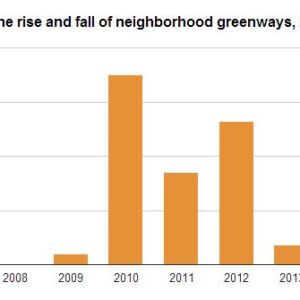
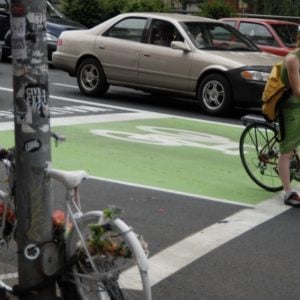
Thanks for reading.
BikePortland has served this community with independent community journalism since 2005. We rely on subscriptions from readers like you to survive. Your financial support is vital in keeping this valuable resource alive and well.
Please subscribe today to strengthen and expand our work.
Is that the entire Sunday Parkways budget? Because… couldn’t we just not have those in 2021?
I volunteered at my very last Parkways in 2019, after having volunteered every year since its inception.
Portland was a smaller town back then, and every year that Parkways grew, so did the city.
In recent years, there was no police presence on the routes and on-route volunteers were in very short supply — both issues which made Parkways MUCH more difficult to manage alongside Portland’s overall growth.
I think that Parkways is badly in need of an overall review and putting it on hold in 2021 would give PBOT time to do that — or to decide that the city has outgrown the event and to come up with new programs that make more sense for the Portland we live in today.
Most of the Sunday Parkways budget is from corporate sponsorships and grants. The $40,000 from PBOT is a small portion of it, but what’s not being counted (but should be) is all the extra personnel involved with it.
And of course $40,000 is 0.225% of what needs to be cut.
In 2010 we had to cut $16 million from the PBOT budget when I served on the TBAC.
The first thing you cut are unfilled staff positions. Remember, you are dealing a projected budget, so it’s not at all like your home budget. These positions are not yet filled, but your baseline budget shows them as filled. A typical position is around $150,000 on your budget, so a cut of 50 unfilled positions is 50 x $150,000 = $7,500,000.
Then you’ll have some people taking early retirement, quitting, and regular scheduled retirement, say another 20 positions total. Another $3 million cut.
That leaves about $7 million more to cut.
Next on the list is reduced street repaving and maintenance. You don’t want to cut too much because for every $ you spend now, you save $11 later on increased costs. Let’s cut $2 million and look elsewhere for $5 million.
Some of the bond payments can be deferred, for another $2 million, leaving $3 million.
The $3 million can come from other delayed projects, based on the cuts to unfilled positions and retirements.
Nothing more to cut.
A position with PBOT is $150,000? I made $52,000 last year breaking my body building things, and I am living a decent middle-class life. Why do they need to be paid so lavishly? Are their jobs that stressful, or are their Inner SE craftsman homes that expensive? These salaries are out of touch with the rest of us.
They probably take home 50% of that, the rest is in benefits like healthcare, vacation and pensions. In other words, they would make 50% more than you do. Which sounds correct for an upper management/government position.
Not many people at the city are making nearly that much. Here’s a salary list for all city positions:
https://www.portlandoregon.gov/bhr/article/401294
Probably best to just plan on cancelling Sunday Parkways now. Avoid any planning costs and focus that money on safe routes to school. I love Sunday Parkways, but with the US not expected to reach herd immunity levels until later in the year, it seems like Sunday Parkways 2021 is not the best idea.
Probably not pertinent to the discussion, but just as an FYI (in case I missed it in the article), the Mayor has asked all City bureaus to cut their budgets, not just PBOT.
PBOT get almost none of its funding from the general fund, the budget for Police, Fire, Parks, etc, except for paying the electric bill for streetlights and signals. Instead PBOT gets nearly all their funding from transportation-specific funding like gas taxes, parking revenue, vehicle registration fees, and whatnot, which is collectively called “GTR” or general transportation revenue. The other bureaus are being “asked” to present a list of cuts, but some bureaus will be cut more than others. PBOT on the other hand MUST cut 10% (or more) because they are short in revenue and the rest of the city won’t help them (except with the power bill).
Make your own personal Parkways anytime you want. Lot more enjoyable not riding in a large mob anyway.
My local neighborhood bikeways are not safe enough for my 3 year-old to ride on.
Well that’s sad. And I’m not being sarcastic. It represents real failure.
I feel like we are entering (or have already entered) a new era of “might makes right” and game-playing. “Might” is anything you care to wield: privilege, majority opinion, physical strength, wealth/market share, whatever. If you have the power to do something, everybody else better get out of your way. So-called “ethics” are being replaced by the creation of ever more unfair rules, acceptance of lying, deception, and “alternative facts” as legitimate tools of any enterprise, and, on the flip side of might-makes-right, the “abuse excuse” for any crime perpetrated against a perceived “privileged” person/entity, who must have come by anything they “own” by illegitimate means, and so deserve to have it stolen or destroyed.
In such an environment, there can be no “safe” streets.
New Gas tax!
$1/gallon
Seems like it is time to change the way we fund active transportation. Why should we rely on gas taxes and car parking revenue to fund active transportation? This method makes it easy for city leaders to avoid investment in their people and continues he hegemony of the automobile and oil industries. What other funding methods are possible?
I have been commuting “actively” for twenty-five years. This has required personal effort, but zero external funding. Paint and bollards have not boosted my level of participation at all. I don’t need an “app”, or anyone to pedal for me. I would appreciate clean, clear streets though. PBOT redefines wasted tax dollars. Moving speed bumps and building Tri-Met stops that suddenly vanish (Naito Pkwy. North of the Broadway Bridge) cost money and make ZERO sense. In regards to Sunday Parkways THERE ARE TOO MANY PEOPLE IN PORTLAND and it SUCKS. How about a why did you move here tax?
I have a great new idea: How about a value-added tax on goods and services in Oregon? – with some of the proceeds going to fund transportation?
Everything you buy got to the store via some form of transportation, and every service requires transportation of some sort, so it makes sense that everyone pay for it.
I hate the gas tax b/c it makes car and truck drivers think they alone pay for roads, when in fact they pay for just a small portion.
Recently I visited the city across the river and paid sales tax on food and other goods, since WA has a sales tax. C’mon, Oregon! It’s time for a sales tax, or VAT.
Citation needed. In Oregon, at least, users of the system pay for most road maintenance/construction.
The state of Oregon already collects sales tax information (for taxes in other states) and Ashland has a city sales tax. Most industries collect VAT info for sales to other countries where VAT is common (the tax rises based on how much processing goes into a product – the value added – food is usually very low, manufactured goods like bicycles are relatively high, cars higher still.)
WA has no income tax, where it’s pretty high in OR once you g
Taxes and fees that actually have been considered by PBOT staff in past years:
– A user fee much like the Arts Tax, very regressive, hits poor people hardest (relatively speaking). A $25 user fee x 650,000 residents = $16,250,000 minus administrative costs.
– A city-wide parking permit program, including in places with plenty of unused on-street parking such as East Portland. Easy to administrate as Portland already has such a program in the neighborhoods surrounding downtown. Chicago and San Francisco already do this.
– A city-wide right-of-way rental program for private utilities and delivery companies. This not only would include FedEx, UPS, the Postal Service, and any other company doing deliveries, but also your cable company, the power, your wireless internet providers, cell towers, and so on. All city customers would pay an extra utility tax or fee that would be tacked on to your monthly bills from these companies or onto your shipping fees.
Three words:
NO MORE TAXES!
Three words:
TAX THE RICH!
Trickle-down is officially 50 years old today. It hasn’t worked.
The RICH just find ways to move money out of the country and out of YOUR reach. Look at what shysters Apple have been.
The RICH also avoid sales taxes by making all their purchases business-to-business through purchase orders and invoices; setting up your personal business is very easy. They avoid property taxes by creating personal trusts and private 501c3 foundation corporations, moving all their taxable property into the trusts, and use the foundations to manage the trusts (they are of course the sole stock holders of the resulting personal corporations.) Capital gains are offset with losses; income is offset with qualified dividends. If the state they live in doesn’t give them a break, they move their mailing address to a state that will (but not necessarily their body.) Only really dumb rich people actually pay any substantial taxes.
A lot of misinformation here from a usually well-informed commenter, but I’ll just point out one:
Qualified dividends don’t offset income, though they do get a lower tax rate than other income or non-qualified dividends (for reasons I don’t understand even after reading the history).
https://en.wikipedia.org/wiki/Qualified_dividend
Cutting Sunday Parkways for 2021 is a no brainer. Won’t be ready for it due to COVID.
On another note, Inarone is as worthless as a committee member as she was as a mayoral candidate.
She must think money grows on trees.
All these leftist protestors/rioters that she supported helped destroy our downtown economy and our tax base. Who wants to spend their hard earned money to come visit a bunch of plywooded businesses surrounded by garbage and hypodermic needles?
I disregard anything Sarah “I AM ANTIFA” Inarone says.
‘Protest’ is not the same as ‘riot’. We have a right to protest, it is fundamental to the republic.
Of course I see all the plywood, but the reason there are so few people behind it is exactly the pandemic, not the protests.
I don’t understand why the Freight program isn’t also on the chopping block? That group has consistently pushed down minority voices. And really the entire program should be headed at the Metro Regionol Council. It’s not a city solo function and has a bunch of sway from people who don’t live in Portland having more say then Portland residents.
That being said, I’m also OK with cuts to Safe Routes to School. At least a pause for the year. The entire program is a way of not addressing equity issues in all trips across the entire network.
I’m also OK with no Sunday Parkways. Why are we paying for services which protestors and bikeswarm/criticalmass types already run crowd control just fine on major protest, which felt a lot like Sunday Parkways, anyhoo. Plus Sunday Parkways draws retail action from typical retail strips like Hawthorne and moves it to Parks. Which I don’t like commercializing parks. That’s what commercial retail zones are for.
And I agree with most of what Sarah says; keep the bike share and reductions in public transit fares for low income, disabled and YOUTH PASSES. We should be cultivating the next round of public transit riders. We don’t need more bike fairies.